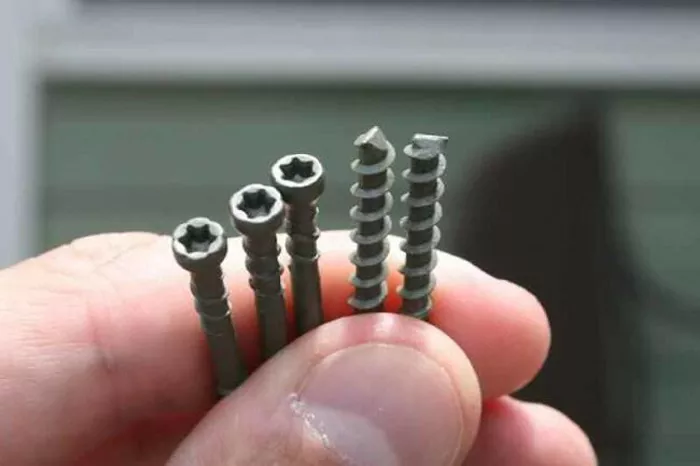When it comes to constructing or renovating wooden decks, choosing the right screws is crucial. Wood deck screws must be strong, durable, and resistant to environmental elements. This article provides a comprehensive evaluation of wood deck screws, helping you understand their types, features, advantages, disadvantages, and the overall price-performance ratio.
Understanding Wood Deck Screws
Wood deck screws are specifically designed to attach wooden planks to a supporting structure. Unlike regular screws, they have features that enhance performance in outdoor environments. The right screws can prevent issues like splitting, corrosion, and structural failure.
Key Features of Wood Deck Screws
Material: Most wood deck screws are made from steel, stainless steel, or coated with weather-resistant materials. Stainless steel screws are ideal for coastal areas due to their corrosion resistance.
Thread Design: The threading can be coarse or fine. Coarse threads provide better grip in softwoods, while fine threads are suitable for hardwoods. Some screws also feature partial threading, allowing for better clamping action.
Head Type: Deck screws typically have either a flat or oval head. Flat heads sit flush with the wood surface, while oval heads provide a decorative finish. The choice depends on aesthetic preferences and application requirements.
Length and Diameter: Deck screws come in various lengths and diameters. The choice of size should correspond to the thickness of the wood being used.
Coatings: Many deck screws are coated with materials like epoxy, ceramic, or galvanized finishes to enhance corrosion resistance. This is essential for outdoor applications.
Types of Wood Deck Screws
1. Stainless Steel Screws
Stainless steel screws are the gold standard for deck construction, particularly in coastal environments. Their resistance to rust and corrosion makes them ideal for prolonged outdoor exposure.
Advantages:
Exceptional corrosion resistance.
Strong and durable.
Aesthetic appeal due to their shiny finish.
Disadvantages:
Higher cost compared to other materials.
May require pre-drilling in hardwoods.
2. Coated Steel Screws
Coated steel screws are often galvanized or epoxy-coated. They provide a good balance between cost and performance, making them popular for many decking projects.
Advantages:
Cost-effective compared to stainless steel.
Good corrosion resistance for most environments.
Variety of colors available for aesthetic matching.
Disadvantages:
Less resistant to corrosion than stainless steel.
Coatings may wear off over time, leading to potential rust issues.
3. Composite Deck Screws
These screws are designed specifically for composite decking materials. They often have a specialized coating to prevent material damage and ensure a secure fit.
Advantages:
Minimized risk of damage to composite materials.
Designed to resist corrosion in specific environments.
Often features a unique thread design for optimal performance.
Disadvantages:
May be more expensive than traditional wood screws.
Not suitable for all types of wood decking.
Performance Evaluation
Strength and Durability
The primary function of wood deck screws is to provide strong connections. High-quality screws are resistant to shearing and pulling forces, ensuring the stability of the deck over time. Stainless steel screws generally provide superior strength, while properly coated steel screws can perform well if used in suitable conditions.
Corrosion Resistance
In outdoor applications, exposure to moisture and other environmental factors is a significant concern. Stainless steel screws excel in corrosion resistance, making them suitable for coastal or humid environments. Coated screws offer reasonable protection but may require periodic inspection and replacement if the coating wears off.
Ease of Installation
Wood deck screws are designed for easy installation. Most have a sharp tip that allows for quick penetration into the wood, reducing the need for pre-drilling. The choice of drive style (Phillips, square, or Torx) can also impact the ease of installation. Torx screws tend to provide better grip and reduce cam-out during installation.
Price-Performance Ratio
When evaluating wood deck screws, it’s essential to consider the price-performance ratio. This ratio assesses the cost against the performance and longevity of the screws.
Cost Considerations
Material Cost: Stainless steel screws typically cost more than coated steel or composite screws. However, their longevity and corrosion resistance may justify the higher initial investment.
Long-Term Value: While coated screws may have a lower upfront cost, they might need to be replaced sooner in harsh environments. In contrast, investing in stainless steel screws can lead to cost savings in the long run due to reduced maintenance and replacement needs.
Performance Evaluation
Durability: A screw that lasts longer will reduce overall project costs. Stainless steel screws, while pricier, often offer superior performance in demanding conditions.
Installation Efficiency: Screws that are easier to install can save time and labor costs. Look for screws that provide a good balance between ease of use and performance.
Recommendations
For Coastal Areas
Choose: Stainless steel screws for their superior corrosion resistance.
Justification: While they may be more expensive, their longevity in harsh environments is invaluable.
For Moderate Climates
Choose: Coated steel screws, preferably with a high-quality finish.
Justification: They offer good performance and are cost-effective for many residential projects.
For Composite Decking
Choose: Composite-specific screws to prevent damage and ensure a secure fit.
Justification: These screws are designed for optimal performance with composite materials, reducing the risk of material degradation.
Conclusion
Selecting the right wood deck screws is crucial for the longevity and stability of your decking project. Understanding the various types, their features, and performance can help you make an informed decision. While cost is an important factor, consider the long-term benefits of investing in high-quality screws, especially in challenging environments. Ultimately, the best choice balances performance, durability, and cost, ensuring your deck remains safe and attractive for years to come.
Related topics:
- Milwaukee Dolly Cart: Comprehensive Review And Analysis
- Pittsburgh 3 Ton Floor Jack: A Comprehensive Tool Evaluation
- A Comprehensive Evaluation Of Hand Sanders

